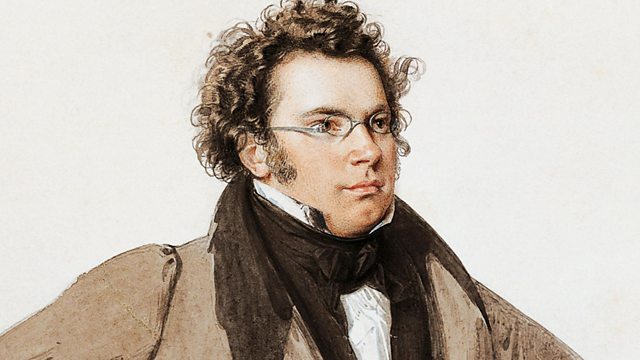
Schubert's circle
Donald Macleod explores the life and music of Franz Schubert. Today, it's a case of wine, men and song, as we spend some quality time with the composer's friends.
Donald Macleod explores the life and music of Franz Schubert. Today, itâs a case of wine, men (Schubertâs circle was predominantly male) and song, as we spend some quality time with the composerâs friends.
Itâs hard to think of a composer more gregarious than Schubert, and further removed from the image of the reclusive genius, closeted away in his artistic ivory tower, creating peerless masterpieces in splendid isolation. From his days at Viennaâs Stadtkonvikt, the Imperial Catholic boarding school that offered the best general and musical education in the Austrian capital, Schubert developed a wide and supportive network of highly cultured friends, with whom he explored art, politics, religion, literature, and, of course, music; frequented the odd tavern or three; and attended convivial social gatherings in the homes of well-heeled admirers, from which developed the tradition of the âSchubertiadâ â informal get-togethers devoted to the performance of Schubertâs music, and above all, his songs. Among Schubertâs bosom buddies were the brilliant, handsome, monied, silver-tongued yet ultimately feckless Franz von Schober, whom the more serious-minded of Schubertâs friends saw as a distinctly malign influence on the impressionable young composer; Anselm Hüttenbrenner, who was gifted the manuscript of the âUnfinishedâ Symphony and, inexplicably, kept it in a drawer for more than four decades before allowing a public performance, in return for the performance of one of his own overtures; and the artist Moritz von Schwind, whose sepia drawing of a Schubertiad, made from memory more than 40 years after the event, captures an idealised and intensely nostalgic recollection of an intimate evening of Schubertâs music with the composer himself at the piano, ârather in the nature of an old gentleman chattering about events at which he was present in his youth and to which he still remains attached in his heartâ.
âAn die Musikâ, D547
Christa Ludwig, mezzo soprano
Geoffrey Parsons, piano
âSuleika Iâ D720
Carolyn Sampson, soprano
Joseph Middleton, piano
âGeheimesâ, D719
Ian Partridge, tenor
Jennifer Partridge, piano
Symphony No 8 in B minor (âUnfinishedâ), D759 (1st mvt, Allegro moderato)
Vienna Philharmonic
Carlos Kleiber, conductor
âÃber Wildemannâ, D884
Dietrich Fischer-Dieskau, baritone
Gerald Moore, piano
âSehnsuchtâ, D879
Dietrich Fischer-Dieskau, baritone
Gerald Moore, piano
âDas Zügenglöckleinâ, D871
Dietrich Fischer-Dieskau, baritone
Gerald Moore, piano
Gesang (âAn Sylviaâ), D891
Dietrich Fischer-Dieskau, baritone
Gerald Moore, piano
String Quartet in D minor, D 810 (âDeath and the Maidenâ) (4th mvt, PrestoâPrestissimo)
Hungarian Quartet
Produced by Chris Barstow
Last on
More episodes
Previous
You are at the first episode
Music Played
-
![]()
Franz Schubert
An Die Musik D.547
Performer: Geoffrey Parsons. Singer: Christa Ludwig.- EMI : CMS-7 64074 2.
- EMI.
- 3.
-
![]()
Franz Schubert
Suleika 1 D.720 Op 14 No 1
Performer: Joseph Middleton. Singer: Carolyn Sampson.- BIS 2343.
- BIS.
- 1.
-
![]()
Franz Schubert
Geheimes D.719 Op 14 No 2
Performer: Jennifer Partridge. Singer: Ian Partridge.- MERIDIAN 84395.
- MERIDIAN.
- 14.
-
![]()
Franz Schubert
Symphony No. 8 in B Minor D.759 1st Movement Allegro moderato
Orchestra: Vienna Philharmonic. Conductor: Carlos Kleiber.- DG 449 745-2.
- DG.
- 5.
-
![]()
Franz Schubert
Uber Wildemann D.884
Performer: Gerald Moore. Singer: Dietrich FischerâDieskau.- DG : 477-8989.
- Deutsche Grammophon.
- 9.
-
![]()
Franz Schubert
Sehnsucht D.879
Performer: Gerald Moore. Singer: Dietrich FischerâDieskau.- DG : 477-8989.
- Deutsche Grammophon.
- 2.
-
![]()
Franz Schubert
Das Zugenglocklein D.871
Performer: Gerald Moore. Singer: Dietrich FischerâDieskau.- DG : 477-8989.
- Deutsche Grammophon.
- 16.
-
![]()
Franz Schubert
An Silvia D.891 from Gesang
Performer: Gerald Moore. Singer: Dietrich FischerâDieskau.- DG : 477-8989.
- Deutsche Grammophon.
- 14.
-
![]()
Franz Schubert
Quartet In D Minor D.810 4th Movement Presto
Ensemble: Hungarian Quartet.- EMI 5 85526 2.
- EMI.
- 8.
Broadcast
- Mon 2 Sep 2019 12:00ÃÛÑ¿´«Ã½ Radio 3
Beethoven Unleashed â the box set
What was really wrong with Beethoven?
Composers A to Z
Who knew? Five eye-opening stories from Composer of the Week
Five reasons why we love Parry's Jerusalem
What is the strange power of Jerusalem which makes strong men weep?
A man out of time â why Parry's music and ideas were at odds with his image...
The composer of Jerusalem was very far from the conservative figure his image suggests.
Composer Help Page
Find resources and contacts for composers from within the classical music industry.





